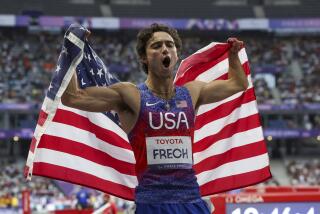Everyone’s a winner at LMU’s Special Games, where love is ‘simple and pure.’
- Share via
There are winners and losers in most sports. But at the Special Games at Loyola Marymount University on Saturday, everyone will get a gold medal.
“We don’t stress competition. People come because it’s just pure fun for them,” said Andrew Shlosser, an LMU communications major and associate director of the games, which will bring nearly 300 mentally and physically disabled athletes to the Westchester campus. “Everyone comes out a winner,” he said.
Now in their 14th year, the daylong games will offer the special athletes a chance to shine in such things as Frisbee tossing, miniature golf, basketball tossing, Ping-Pong, T-ball and bowling. There also will be running events, including a category for wheelchair athletes.
A parade complete with a band and life-size versions of popular cartoon characters will start the day’s festivities. Five athletes will pass an Olympic torch in a relay.
“It’s a chance for our residents to have their moment where there really is a positive focus on them,” said Pat Holmes, development director at Harbor View House, a residential care facility for the chronically mentally ill in San Pedro.
Harbor View will send 30 athletes to the games. There also will be participants from 14 other social service agencies, as well as from the Catholic Archdiocese of Los Angeles and private families. Athletes, who will come from as far away as Santa Barbara and San Diego, range in age from 7 to 50.
From the beginning, the games have been a student project. A 14-member committee spends most of the year planning and organizing the event, which was originally part of the Special Olympics program for the mentally handicapped. Organizers of the LMU event later broke away because they wanted to include the physically handicapped.
The games--which include two practice sessions as well as what is known as “the big day”--involve about 500 volunteers. They include LMU students, teen-agers from local intermediate and high schools and people in the Westchester community.
Volunteers raise the $30,000 it takes to stage the games. They set up equipment for the various events, serve food to the athletes and clean up when it’s over.
They blow up the hundreds of orange, red and yellow balloons that festoon the university’s Sunken Gardens, where the games take place. Others run booths where people may have their faces painted or have buttons made with special messages.
Volunteer coaches stay with athletes all day, helping them get around and in some cases giving them an extra boost in some of the events. “In the basketball throw, the coach might help them lift the ball,” said Shlosser. “Some can throw, but they have a hard time getting the ball up.”
Holmes said the volunteers make sure the athletes “have a good time and are enjoying themselves. They make it a really gala occasion.”
Several LMU students said they were nervous about working with disabled athletes at first, but volunteering for the games quickly became a highlight of their school year.
Liberal studies major Becky Brown, who has been involved in the games for three years, said she was worried that she would be unable to communicate with the first athlete she coached. The girl, a teen-ager with cerebral palsy, couldn’t speak.
“I was really frustrated and worried that I was talking to myself,” said Brown. “But I could see in her eyes, and by the expressions on her face, that she understood. She would nod her head yes and no, and a smile meant you’d said something funny.”
Games Director Matthew Lopez, an art and political science major, said he has become “less inhibited” around handicapped people because of the games. “They like to hug, and they give out love for simple things, when you give them a drink of water or help them with the event,” he said. “You can see they’re really thankful, and it’s simple and pure, not faked at all.”
Shlosser said that although putting on the games is a lot of work, the volunteers get more out of the day than they give. “There is so much unconditional love on the field,” he said. “Everybody is having such a good time.”
Since many athletes participate in the games year after year, there will be some joyous reunions with the LMU students Saturday. “There really is a true friendship that develops,” said Bernice Russell, staff adviser of the games committee.
In some cases, these friendships extend throughout the year. LMU students call the athletes and send holiday cards. Last Christmas, they gave a Christmas party at Harbor View.
Said Alfredo Zuany, program coordinator at the Crippled Children’s Society in East Los Angeles: “(The athletes) feel they have an older brother or sister they didn’t have.”
The games usually draw more than 1,000 people, many of them the enthusiastic parents, brothers and sisters of the athletes.
For nine years, Brenda Lauriat’s cheering section was led by her sister, Sheila Riley, who died suddenly late last year of a brain tumor.
On Saturday, Lauriat, a resident at Harbor View, will read a poem she wrote recalling the good times they had together at the games. Said Lauriat: “We loved it here very much. She always said (I should) just keep my chin up and a smile on my face.”
What: Special Games.
When: Saturday, 9 a.m. to 4 p.m.
Where: Loyola Marymount University Sunken Gardens, Loyola Boulevard at West 80th Street, Westchester.
Admission: Free.
Information: 338-2728.
More to Read
Get our high school sports newsletter
Prep Rally is devoted to the SoCal high school sports experience, bringing you scores, stories and a behind-the-scenes look at what makes prep sports so popular.
You may occasionally receive promotional content from the Los Angeles Times.






